高中英语必修五 Unit 4 Making the news-Extensive Reading[新人教版课件]
- 格式:ppt
- 大小:2.22 MB
- 文档页数:3
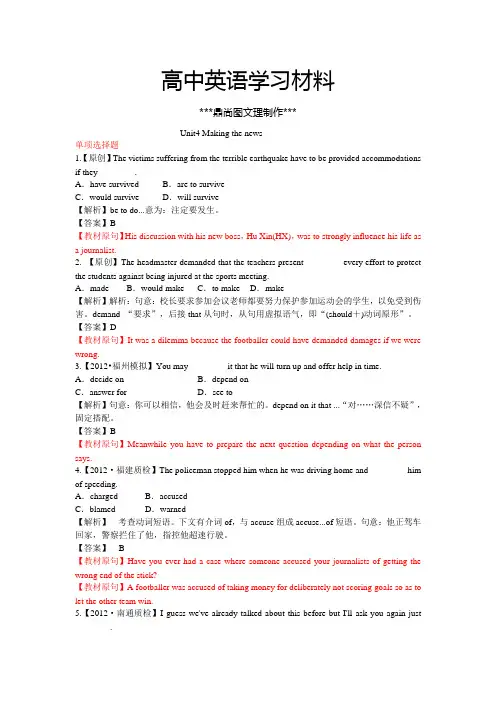
高中英语学习材料***鼎尚图文理制作***Unit4 Making the news单项选择题1.【原创】The victims suffering from the terrible earthquake have to be provided accommodations if they ________.A.have survived B.are to surviveC.would survive D.will survive【解析】be to do...意为:注定要发生。
【答案】B【教材原句】His discussion with his new boss,Hu Xin(HX),was to strongly influence his life asa journalist.2. 【原创】The headmaster demanded that the teachers present ________ every effort to protect the students against being injured at the sports meeting.A.made B.would make C.to make D.make【解析】解析:句意:校长要求参加会议老师都要努力保护参加运动会的学生,以免受到伤害。
demand “要求”,后接that从句时,从句用虚拟语气,即“(should+)动词原形”。
【答案】D【教材原句】It was a dilemma because the footballer could have demanded damages if we were wrong.3.【2012•福州模拟】You may ________ it that he will turn up and offer help in time. A.decide on B.depend onC.answer for D.see to【解析】句意:你可以相信,他会及时赶来帮忙的。
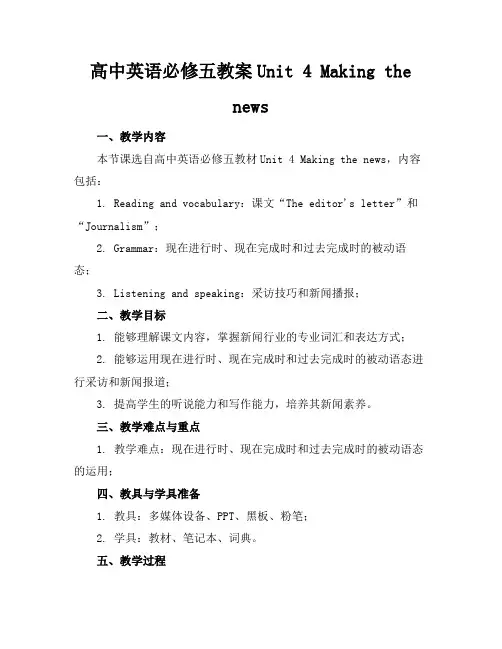
高中英语必修五教案Unit 4 Making thenews一、教学内容本节课选自高中英语必修五教材Unit 4 Making the news,内容包括:1. Reading and vocabulary:课文“The editor's letter”和“Journalism”;2. Grammar:现在进行时、现在完成时和过去完成时的被动语态;3. Listening and speaking:采访技巧和新闻播报;二、教学目标1. 能够理解课文内容,掌握新闻行业的专业词汇和表达方式;2. 能够运用现在进行时、现在完成时和过去完成时的被动语态进行采访和新闻报道;3. 提高学生的听说能力和写作能力,培养其新闻素养。
三、教学难点与重点1. 教学难点:现在进行时、现在完成时和过去完成时的被动语态的运用;四、教具与学具准备1. 教具:多媒体设备、PPT、黑板、粉笔;2. 学具:教材、笔记本、词典。
五、教学过程1. 导入:通过展示新闻图片和播放新闻视频,引起学生对新闻行业的兴趣,引出本节课的主题;2. 阅读课文:让学生阅读课文“The editor's letter”和“Journalism”,并回答相关问题;3. 词汇学习:讲解新闻行业的专业词汇,让学生进行词汇练习;4. 语法讲解:通过例句和练习,让学生掌握现在进行时、现在完成时和过去完成时的被动语态;5. 听力练习:播放采访和新闻播报的音频,让学生练习听力并模仿;6. 口语练习:组织学生进行角色扮演,模拟采访和新闻播报;六、板书设计1. 新闻词汇;2. 现在进行时、现在完成时和过去完成时的被动语态;3. 采访技巧和新闻播报要点;七、作业设计1. 作业题目:根据课堂所学,编写一篇关于学校活动的新闻稿。
答案:略。
例子:People are interviewing the famous actor now.答案:The famous actor is being interviewed people now.八、课后反思及拓展延伸2. 拓展延伸:鼓励学生关注国内外新闻,了解不同类型的新闻报道,提高英语新闻阅读能力。
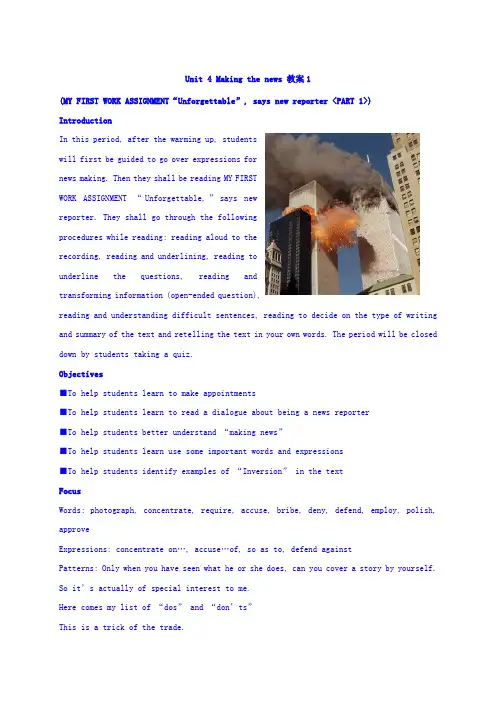
Unit 4 Making the news 教案1(MY FIRST WORK ASSIGNMENT“Unforgettable”, says new reporter <PART 1>)IntroductionIn this period, after the warming up, studentswill first be guided to go over expressions fornews making. Then they shall be reading MY FIRSTWORK ASSIGNMENT “Unforgettable,”says newreporter. They shall go through the followingprocedures while reading: reading aloud to therecording, reading and underlining, reading tounderline the questions, reading andtransforming information (open-ended question),reading and understanding difficult sentences, reading to decide on the type of writing and summary of the text and retelling the text in your own words. The period will be closed down by students taking a quiz.Objectives■To help students learn to make appointments■To help students learn to read a dialogue about being a news reporter■To help students better understand “making news”■To help students learn use some important words and expressions■To help students identify examples of “Inversion” in the textFocusWords: photograph, concentrate, require, accuse, bribe, deny, defend, employ, polish, approveExpressions: concentrate on…, accuse…of, so as to, defend againstPatterns: Only when you have seen what he or she does, can you cover a story by yourself. So it’s actually of special interest to me.Here comes my list of “dos” and “don’ts”This is a trick of the trade.This is how the story goes.Later we were proved right.AidsMultimedia facilities, tape-recorder, photos, diagramsProcedures1. Warming up⑴ Warming up by discussingThink like a reporterHi, everyone. Today we will learn something about making the news. Suppose you work for China Daily, what types of jobs do you choose? What does it involve? Now in pairs discuss them. Give reasons for your choice.Types of jobs: What it involvesReporter Interviews people or finds out about events from onlookersPhotographer Takes photographs of important people or eventsEditor Makes sure the writing is clear, concise and accurate; checks factsDesigner Lays out the article and photographsPrinter Prints the newspaperWell done! By the way, have you ever heard “journalist”? Is there any difference between journalist and reporter? Ordinarily speaking, a reporter is a person whose job is to discover information about news events and describe them for a newspaper or magazine or for radio or television. And a journalist is a person who writes news stories or articles for a newspaper or magazine or broadcasts them on radio or television. Maybe in Chinese we can understand it better: reporter; journalistreporter=news reporter“新闻记者”,特指外出采访的记者。
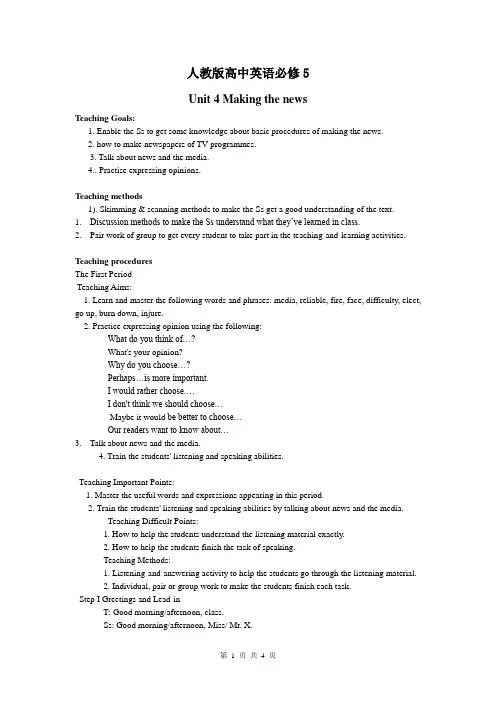
人教版高中英语必修5Unit 4 Making the newsTeaching Goals:1. Enable the Ss to get some knowledge about basic procedures of making the news.2. how to make newspapers of TV programmes.3. Talk about news and the media.4.. Practise expressing opinions.Teaching methods1). Skimming & scanning methods to make the Ss get a good understanding of the text.1.Discussion methods to make the Ss understand what they’ve learned in class.2.Pair work of group to get every student to take part in the teaching-and-learning activities.Teaching proceduresThe First PeriodTeaching Aims:1. Learn and master the following words and phrases: media, reliable, fire, face, difficulty, elect, go up, burn down, injure.2. Practice expressing opinion using the following:What do you think of…?What's your opinion?Why do you choose…?Perhaps…is more important.I would rather choose.…I don't think we should choose…Maybe it would be better to choose…Our readers want to know about…3.Talk about news and the media.4. Train the students' listening and speaking abilities.Teaching Important Points:1. Master the useful words and expressions appearing in this period.2. Train the students' listening and speaking abilities by talking about news and the media.Teaching Difficult Points:1. How to help the students understand the listening material exactly.2. How to help the students finish the task of speaking.Teaching Methods:1. Listening-and-answering activity to help the students go through the listening material.2. Individual, pair or group work to make the students finish each task.Step I Greetings and Lead-inT: Good morning/afternoon, class.Ss: Good morning/afternoon, Miss/ Mr. X.T: Sit down, please. Being the members of the society, we all cares for/about what happens around us or even what happens at home and abroad. How can you do so?Ss: By reading newspapers and magazines, watching TV programmes,listening to the radio.T: Are there any other ways? Think it over.Ss: By a website.T: Yes. It’s also a way to learn about the world. What do you call these things which help us know about to the world?Ss:新闻媒体T: In English, we call it news media. First, let's learn the new words in this period. Look at the screen.(Teacher first asks some students to read the words on the screen. Correct the Ss' mistakes in pronunciation. Then teacher gives brief explanations. At last, let the Ss read and remember them for a while.)Step ⅡWarming upT: Well, now please open your books at Page 9. Warming up first. Look at each of the pictures and tell me which kind of news media it shows?Ss: The first picture shows a website; the second one shows radio; the third one shows TV programmes; the fourth one shows magazines; the fifth one shows newspapers.T: Quite right! Now, please work in groups of four and discuss the five questions below the pictures. A few minutes later, I’ll check your answers. OK?Ss: OK.T: You can begin now.(A few minutes later. )T: Are you ready now?Ss: Yes.T: Which group would like to talk about the first question? Choose one member of your group to answer the question.S1: I think TV is the most reliable among the news media. TV consists of a series of lively consecutive pictures. For the peoplewho want to know what is exactly happening, a picture responds better to offer the truth of a fact than the mere words upon a page. It can offer an unique function of seemingly on-the-spot feeling, which is not available to the other media.T: The second question?S2. I think TV programmes are easy for most people to understand. Radio, can only be heard and sometimes can’t be picked up clearly. Newspapers and magazines are only useful for people who can read. Websites have many different pages, but you should be careful to read some of the pages. who can read. Website have many different pages, but you should be careful to read some of the pages.T: The third question?S3 : I will check other sources.T: The fourth question?S4: Every morning, the newspaper chief editor and the journalists discuss the main events of the day. Reporters are then sent to cover the events. They usually do some interviews and then check the information. They must work very fast. Later in the day, everything is put together at the news desk. Then the editors read the stories and make any necessary changes and choose a good title for eachstory. At last, they print them quickly and deliver them. Making a magazine is more or less the same as making a newspaper. But the articles in a magazine are more like stories, which are writtenby all kinds of writers. Magazines are not published as quickly as newspapers.T: The last question?Ss: News broadcast, newspaper, magazine, radio programme, website,report, re porter, editor, interview, write articles…Step ⅢListeningT: Next, let's come to the Listening. We are going to listen to two parts of conversations. The first part is an interview; the second part is a dialogue. Now, look at Exercise 1:Listen carefully towhat is said and tick the information you hear in each part. If necessary, I'll play it twice. (Teacher begins to play the tape, and checks the answers after listening. Then ask the students to finish the rest of the tasks. )T: OK. Now, please listen to each part once again and then work inpairs to talk about the questions in Exercises 2,3,4 and 5. Are youclear?Ss: Yes.(Teacher allows them enough time to talk about the questions. Thenask some students to say their answers.)Step IV SpeakingT:Well,now it's time for us to be the editors of a newspaper. Here is a list of ten things that happened today. Look at the screen. (Teacher shows the screen and read through the list to the whole class.)200 people died in an earthquake in Turkey.China beat Brazil 5-1 in football.France elected a new President.Three children from your city were killed.Someone robbed a bank in Shanghai.Food prices are going up.A house in your town burned down. Nobody was injured. 2 000 people in your city were happy today and moved into new buildings. A Chinese scientist has invented a new car engine that does not pollute the air. There is a rumor that a large company wants to build a factory in your town:(Bb :go up, burn down)T: Now, you've known the ten things, but you only need to reportfive of them. So, first decide which events you are going to put in your newspaper. Then give reasons for your choices and compare with your classmates. Work in groups of four or five. And the following expressions on the screen can help you with your dialogue. After a while, I'll ask some of you to act out your dialogue.(Teacher shows the screen. )What do you think of'…?I would rather choose.…What's your opinion?I don't think we should choose…Why do you choose…Maybe it would be better to choose…Perhaps… is more important.Our readers want to know about….(Teacher goes around the Ss and checks their work. If necessary, teacher may join in them. )。
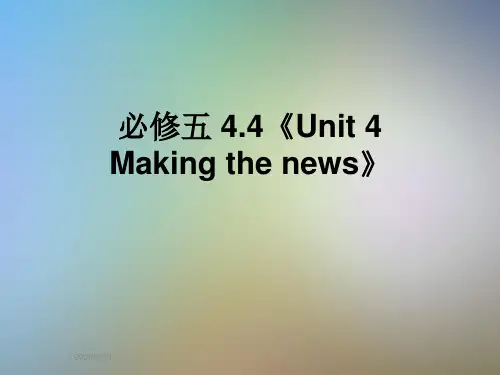
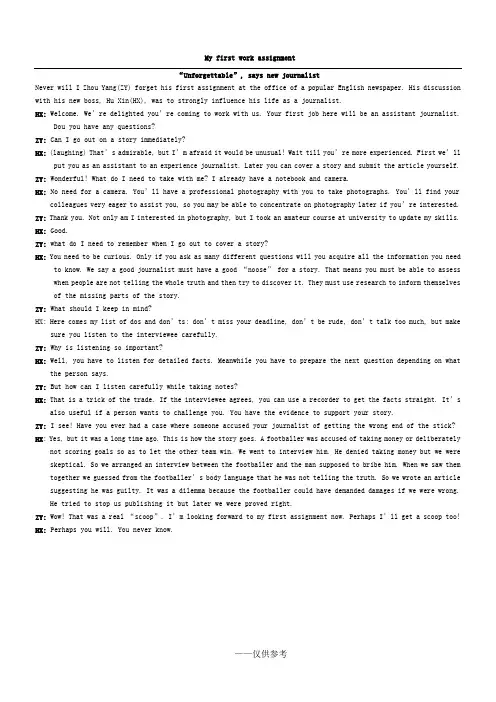
My first work assignment“Unforgettable”, says new journalistNever will I Zhou Yang(ZY) forget his first assignment at the office of a popular English newspaper. His discussion with his new boss, Hu Xin(HX), was to strongly influence his life as a journalist.HX: Welcome. We’re delighted you’re coming to work with us. Your first job here will be an assistant journalist.Dou you have any questions?ZY: Can I go out on a story immediately?HX:(laughing) That’s admirable, but I’m afraid it would be unusual! Wait till you’re more experienced. First we’ll put you as an assistant to an experience journalist. Later you can cover a story and submit the article yourself. ZY: Wonderful! What do I need to take with me? I already have a notebook and camera.HX: No need for a camera. You’ll have a professional photography with you to take photographs. Yo u’ll find yourZY:HX:when themselves ZY:ZY:HX:ZY:HX:’s ZY:HX: Yes,article ZY: Wow! That was a real “scoop”. I’m looking forward to my first assignment now. Perhaps I’ll get a scoop too!HX: Perhaps you will. You never know.——仅供参考。
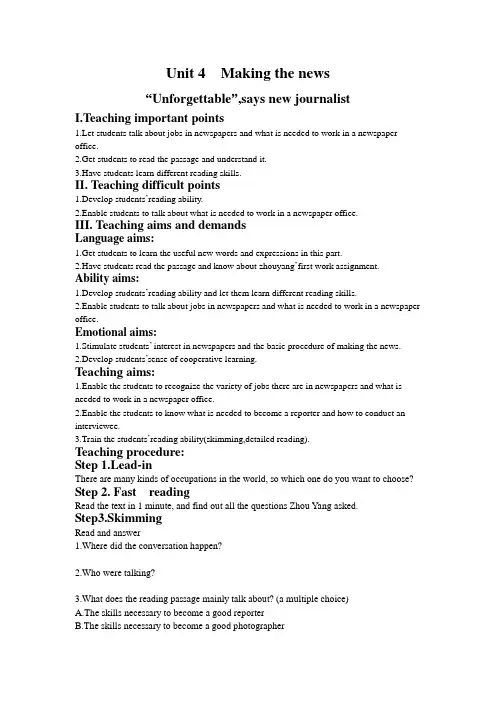
Unit 4 Making the news“Unforgettable”,says new journalistI.Teaching important points1.Let students talk about jobs in newspapers and what is needed to work in a newspaper office.2.Get students to read the passage and understand it.3.Have students learn different reading skills.II. Teaching difficult points1.Develop students’reading ability.2.Enable students to talk about what is needed to work in a newspaper office.III. Teaching aims and demandsLanguage aims:1.Get students to learn the useful new words and expressions in this part.2.Have students read the passage and know about zhouyang’first work assignment.Ability aims:1.Develop students’reading ability and let them learn different reading skills.2.Enable students to talk about jobs in newspapers and what is needed to work in a newspaper office.Emotional aims:1.Stimulate students’ interest in newspapers and the basic procedure of making the news.2.Develop students’sense of cooperative learning.Teaching aims:1.Enable the students to recognize the variety of jobs there are in newspapers and what is needed to work in a newspaper office.2.Enable the students to know what is needed to become a reporter and how to conduct an interviewee.3.Train the students’reading ability(skimming,detailed reading).Teaching procedure:Step 1.Lead-inThere are many kinds of occupations in the world, so which one do you want to choose? Step 2. Fast readingRead the text in 1 minute, and find out all the questions Zhou Yang asked.Step3.SkimmingRead and answer1.Where did the conversation happen?________________________________________________________________________ 2.Who were talking?________________________________________________________________________3.What does the reading passage mainly talk about? (a multiple choice)A.The skills necessary to become a good reporterB.The skills necessary to become a good photographerC.How to conduct a good interviewD.Being carefully in the new environmentE.A and CStep4.Careful readingWe can divide the passage into three parts according to the duties of a journalist.Part1.___________________________________________________________________ Part2.___________________________________________________________________ Part3.___________________________________________________________________ Part 1:(From the beginning to“Good”)1.When can a new journalist cover a story by himself?___________A. Never can a new journalist cover a story by himself.B. Only after he has seen what an experienced journalist does.C. Not until he is old enough .D. Only when he takes a camera with him.2.Zhou Yang took a course of photography at mid-school.(T/F)3.What a new journalist should do on the first day?(1). First he will be put as an assistant to an____________________________________(2).____________________________ him to take a________ with him. He will have a professional ____________ with him to take photographs.Part2.(From“What do I”to“support your story”)(1)While interviewing, the journalist would just ask the questions prepared in advance(预先).(T/F)(2)What a journalist needs to remember when going out to cover a story?a.He needs to be _________.b.A good journalist must have a good“_____”for a story.c.He has to listen for the _____________.d. If necessary, he can prepare a________ to make sure that he gets all the facts straight. Part 3 :(From “I see!”to the end)(1). The footballer admitted he took the money(T/F)(2).Zhou Yang is very eager to cover a story .(T/F)(3)The footballer was thought to be guilty because_______ .A. He usually told lies.B. He stopped the reporter publishing an article.C. He took money for deliberately not scoring goals so as to let the other team win.D. He bribed another football team.prehending(1)Zhou Yang’s notesSkills——◆We need to be _______ .◆To____all the information we need to know, we have to ask many different______ .◆To be a good reporter, we must have a “____ ”for a story.◆When we find people are not _______ , we must find out the missing parts of the ______ .Tips——Dos:◆______ to the answers carefully.Don’ts:◆Don’t be _____.◆Don’t talk too much ourselves.(2)Choose the correct explanation to the phrasesa.1 what do I need to remember when I go out to cover a story.( )A. tell a storyB. write storyC. send a storyD. report a storyb. A good journalist must have a good “nose”for a story.( )A. know what has happened.B.be able to “smell”the truth when somebody is telling part of it.C. be able to discover the whole truth by doing research.D. B and Cc. This is a trick of the trade.( )A. something that cheats somebodyB. something that helps you do the job in a professional way.C. something used to hide secrets.d.We sometimes use small recorders to make sure that we get all your facts straight.( )A. to make sure that the story is accurateB. to get the facts directlyC. to get the things speciallyStep 6.Post-reading——SummaryTo the journalists, there is no ______ for them to take a camera because they have professional ___________ with them. The journalists should be ________ and they must have a good _____ for a story. They know how to _______the information they need. While interviewing, they won’t be _____, they won’t_____ too much, and they ____ ___ the interviewee carefully. They will listen to the _______ facts and ask new questions. There is a trick of the _____, that is, with the permission of the interviewee, they would use a ________ which could keep the evidence to help __________their story.Step 7.Discussion(1)What is news?(2)Practice –interviewingStep 8.HomeworkFinish the exercise in«世纪金榜»P45 1,2,3.。
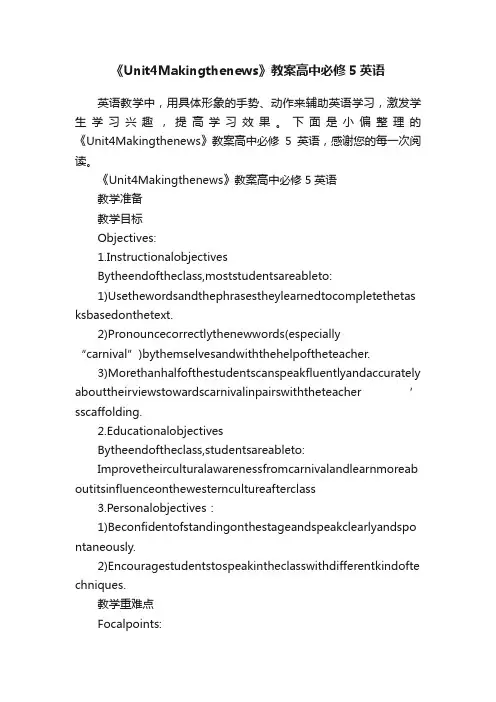
《Unit4Makingthenews》教案高中必修5英语英语教学中,用具体形象的手势、动作来辅助英语学习,激发学生学习兴趣,提高学习效果。
下面是小偏整理的《Unit4Makingthenews》教案高中必修5英语,感谢您的每一次阅读。
《Unit4Makingthenews》教案高中必修5英语教学准备教学目标Objectives:1.InstructionalobjectivesBytheendoftheclass,moststudentsareableto:1)Usethewordsandthephrasestheylearnedtocompletethetas ksbasedonthetext.2)Pronouncecorrectlythenewwords(especially “carnival”)bythemselvesandwiththehelpoftheteacher.3)Morethanhalfofthestudentscanspeakfluentlyandaccurately abouttheirviewstowardscarnivalinpairswiththeteacher’sscaffolding.cationalobjectivesBytheendoftheclass,studentsareableto:Improvetheirculturalawarenessfromcarnivalandlearnmoreab outitsinfluenceonthewesterncultureafterclass3.Personalobjectives:1)Beconfidentofstandingonthestageandspeakclearlyandspo ntaneously.2)Encouragestudentstospeakintheclasswithdifferentkindofte chniques.教学重难点Focalpoints:Bytheendoftheclass,studentsareableto:1)Improvethemainreadingskillsthroughcompletingreadingta sksinpairworkandgroupwork.2)Usethetabletofinishtheiressayabouttheirfavoritefilm.Difficultpoints:Bytheendoftheclass,studentsareableto:1)speakfluentlyandaccuratelyabouttheirfavoritefilmsinpairs withtheteacher’sscaffolding.2)Writeafilmreviewaccordingtothetableandthetext.教学过程ProceduresandtimeallotmentStage1GettingstudentsreadyforlearningT:Classbegins!Ss:…T:Goodafternoon,class!Ss:…T:Today,let’scometoCultureCorner.Module4.DoyouknowChinesefestivals?Ss:…T:First,Workingroups,discussandmakealistofChinesefestivalsi nEnglish.(1min).Ss:…T:OK,timeisup.YouknowChinesefestivals?Ss:…T:verygood.Forexample1.NewYear’sDay元旦节(1月1日)2.SpringFestival春节(农历正月初一)nternFestival元宵节(农历正月15)4.theQingmingFestival清明节(4月5日)5.DragonBoatFestival端午节(农历5月初五6.Double-ninthDay重阳节(农历9月初九)7.NationalDay国庆节(10月1日)T:Andfestivalsbroughtusmuchtraditionalknowledge.So,festiv alisbeautiful.Doyouknowforeignfestivals?Ss:...T:Inthetextbook,therearesomefestivalswithpictures.Doyoukn owtherightdescriptionsaboutthem?Ss:...T:ThisfestivalisattheendofOctober,when“ghosts”comeout.Ss:...T:ThisiswhenAmericansrememberthehardtimeswhentheyfirs tarrivedinthecountry.Ss:..T:Thisisafestivalofcolor,whichmarksthebeginningofspringinIn dia.Ss:...T:ThisisaChristianfestivalwhichcomesinthemiddleofwinterSs:...T:Let’swatchavideo.Canyouguesswhatfestivalitis?.T:Theyaredressedupinspecialclothes,andtheyarewearmasks.Ss:...T:now,Firstquestionishowdopeoplefeelonthisfestival?Second iswhatfestivalisit?Ss:...T:Yes,verygood.Now,let’swatchavideoaboutCarnival.Ss:...T:whatdoyourememberaboutcarnival?Ss:...T:Wherediditfirst?Ss:...Stage2Pre-readingStep1.Listentothetape.T:Let'slistentothefollowingpassagetolearnmoreaboutcarnival .Trytofindoutwhatplacesarementionedintermsofcarnivalcelebrati ons.Ss:..T:...Step2.Scanthepassageandtrytoanswerthequestions.T:Whatisthemeaningofcarnival?Ss:...T:Originallyitmeant“withnomeat”butnowitsymbolizes “life”.Step3.ReadthepassageandmatchcolumnAwithcolumnB.T:OK,nowIwillgiveyou1minutetoreaditagainandthenIwillasky ousomeStage3While-readingStep1Readthepassage.Choosethebestanswerstothetwosente nces.T:areyoufinish?Let’slookatthequestions.firstquestionisT odayCarnivalhasbecomeacelebrationof____. Whichoneyouchoose?A.freedomB.harvestC.lifeitselfD.successSs:...T:YES,verygood.NextquestionisWeneedto_____tounderstand whatcarnivalisallabout.A.lookatthehistoryofAmericaB.gotoAmericaC.lookatthemeetingoftwocultures---EuropeanandAfricanD.BothAandCSs:...T:....Step2checkwhetherthestatementsaretrueorfalse.T:…T:Now,let’scheck.Withtheopeningofhugefarmsandplantations,manyAfrica nswenttolookforjobsinAmerica.,what’syouridea?Ss:…T:Doyouagree?Ss:…T:Excellent,inparagraph2,thismarkedthebeginningoftheslave trade.Sothequestion1isFalse.T:nextquestion2,TheEuropeansimportedtheirfestivalsandlate rtheslaveslearnedfromthemandaddedtheirtraditions.Ss:...T:verygood.Thisanswerinparagraph3.Ss:...T:question3,Theslavetradewasabolishedandthesalvestookoverthecarnival.Ss:...T:thelast,Withthepassingoftime,carnivalbecameafestivalofth eblackpeopleonly.Ss:…T:Exactly!Superb!Step3SkimmingforspecificinformationTask:Answerthequestionsaccordingtothepassage.T:Readthetextcarefullyandanswerthequestions.Next,wewillreadthetextagaintoexplorehowthetextorganized. 3minutes,Let’sgo!T:Now,let’scheckyouranswers.Whatiscarnivaltoday?Ss:Carnivaltodayisaninternational,multiculturalexperience.T:ThesecondquestionisWhereweretheslavestakenfrom?Ss:InAfricaT:....T:Excellent!Stage5Post-readingDiscussion:UsefulquestionstomakeupdialoguesT:therehavesevenquestions,usefulquestionstomakeupdialog ues.Haveyoudressedupinspecialclothes?2Whatdidyouwear?3Howdidyoufeel?4Didyoueatspecialfood?5Didyougiveorreceivegifts?6Didyouhaveaholidayfromschool?7Didyouenjoyyourselfwithyourfamilyorfriends?T:Iwilldividetheclassinto3studentsinagroup.3minutes,1,2,beg in!Ss:...T:Timeisup.whichonedoyouchoose?Ss:....T:Yes,sothethemeofFrankensteinisaboutscienceandhumanity.T:OK,nextgroup,doyouhaveotheranswer?Ss:...课后习题homeworkDoexercisesonPage37-38.人教版高中英语必修5《Unit4Makingthenews》教案【二】Period1&2warmingupandreadingTeachingAims:1.Enablethestudentstotalkaboutthequalitiesneededtobeago odreporterandhowtoconductagoodinterview2.Enablethestudentstolearnsomereadingstrategies3.Enablethestudentstolearnthenecessaryqualitiesintheirfutur ejobImportantPointsanddifficultpointsLearnabouthowtobeagoodreporterTeachingmethodsStrategicreadingmethod;Task-basedmethodTeachingprocedures:I.Elaboration(warmingup):Helpthestudentstorelatetheirknow nknowledgetothetopicthatwillbelearnedTask1:(groupdiscussion)TalkaboutjobsinChinaDaily?TypesofjobsWhatitinvolvesreporterTask2:Predictwhatisgoingtobelearnedbylookingatthetitleoft hetext.Whichtypeofjobwillbetalkedaboutinthetext?II.Prediction(pre-reading):Task3:Predictthemainideaofthetextbydiscussingthefollowing questions:1.Whatarethequalitiesagoodnewsreporterneedstohave?(HavegroupdiscussionfirstandthenfinishPart1individually)2.Whatyourfirstdayatschoolwaslike?Howwouldyoufeelonyou rfirstdayatwork?(Groupdiscussion)III.Skimming,scanning,analyzing(Reading&Comprehending) Task4:Readthetextquicklytogetageneralideaofthetext.Task5:Dividethepassageintothreesectionsandmatchthefollo wingmainideastothethreesections:HowtogetanaccuratestoryHowtoprotectastoryfromaccusationsHowtobecomeareporterTheskillsneededTheimportanceoflisteningStagesinresearchingastoryHowtocheckfactsHowtodealwithaccusationsofprintingliesWorkinateamTask6Readquicklytofindouttheinformationtofillintheformbel owTask7:Tellwhatisrequiredforareporterandaphotographerpatient;imaginative;well-organized;technicallygood;polite;concise;thorough;creative;curio us;careful;gifted;professionalAreporterAphotographerIV.SummarizingTask8:WriteasummaryofthetextV.AssignmentReadanEnglishnewspaperandretellthemainideaofonearticlei nit.Period3&4Words&ExpressionsTeachingAims:Getthestudentstoknowhowtousesomewordsandexpressions correctlyandappropriatelyImportantPointsanddifficultpointsUsesomewordsandexpressionscorrectlyandappropriatelyTeachingmethodsDemonstratingandsummarizing;practicingTeachingprocedures:1.occupationn.1).Teachingismyoccupation.职业2).Swimmingismyoccupation.使…忙碌的事情;消遣occupyv.occupied=busyoccupyoneselfin/withsth.employment;occupation;job;profession;vocation;work;trade Heislookingaroundfor.:artistHeisoutof.Shechoseteachingasher.She’salawyerby.He’sacarpenterby.2.assignv.assignmentn. Shegladlyacceptedtheassignment.(分派的任务;工作) TheEnglishassignmentisabookreport.(课外作业,功课)3.onone’sownofone’sownforone’sownWeshouldcompletethetest_________4.experiencedadj.beexperiencedin/atsth/doingsth. Whoisexperiencedincookinginyourhome?5.Thefirst/lasttime+时间状语从句ThefirsttimeIcamehere,Iwasnotusedtotheclimatehere. Covern.封面,掩盖(物);v.1).Tomwillcoveredtheoutbreakofthedisease.2).Theroadwascoveredwithsnow.3).Shelaughedtocoverherworry.4).Theredarmycoveredabout30milesaday.5).Isthemoneyenoughtocoverthecostofanewshirt?7.Beeagerforsth.(sucess)todosth.thatclauseHeiseagertoseehisdaughter. Weareeagerthattheprojectshouldbestartedearly beanxiousabout=beworriedabout8.Concentrateonsth./doingsth. Weshouldconcentrateonourstudy. Tomisconcentratingonfishing.9.of+抽象名词(importance;value;use;help;benefit) ofspecialinterest=ofnouse=Themeetingisofgreatimportance.=Eachminuteis_____forus.ofgreatlyvaluablegreatvaluableofgreatvalueformuchvalue10.acquire;get;gain1).Isatinthefrontofthebusto____agoodviewofthecountryside.2).Graduallywe_______experienceinhowtodothework.3).They_____thevictoryafterabloodybattle.11.haveanosefor嗅觉灵敏Shehasanearformusic.有鉴赏能力Shehasaneyeforcolorandstyleinclothes.有眼光12.Meanwhile=inthemeanwhile=inthemeantime=atthesametimeMotherwentshopping;meanwhile,Icleanedthehouse13.traden.v.1).JapandoeslotsoftradewiththeUnitedStates.2).Heisashoemakerbytrade.3).Shetrades3applesforsomebananas.14.Trick1).窍门,手法2).playatrick(joke)onsb.=makefunofsb.(玩笑,恶作剧)3).Hegotintothebuildingbyatrick(诡计,花招)15.Challenge1).Hechallengemyviewonthatmatter.2).Tofinishthejobin2dayswasarealchallenge.16.Supportn.1).Ineedyoursupport.v.1)为…提供证据,证实2)Theoldmanenteredtheroomsupportedbyhisgrandson.3).Hehasalwayssupportedtheweakerparty.4).Hehasalargefamilytosupport.17.Case1).Hethoughthehadsolvedtheproblem,butthatwasnotthecase.2).Hereisacaseofbeingcareless.3).Wewilllookintothatcase.incaseofsth.如果,万一…inthat/thiscase在那样/这样情况下innocase决不incase+从句以防;可能;倘若Takeanumbrellaincaseitrains.(incase从句常用一般现在时表将来,或should+do)17.accusesb.ofsth.=chargesb.withsth.Tom____hisbossofhavingbrokenhisword.blamedaccusedchargedscolded18.soastodosth.只能在句末=inordertodosth.=sothat+从句=inorderthat+从句Igotupatfivesoastocatchthetrain=19.admitadmitdoing/havingdoneadmitsb.Into/to(theuniversity)Lilyfinallyadmitted___myumbrellabymistake.totaketohavetakenhavingtakenhavetaken20.n.adj.professionprofessional具有….特点FinishEx3onPage29AssignmentFinishEx1andEx2onPage28andEx3onPage29(Discoveringuse fulwordsandexpressions)FinishEx2,Ex3onPage63andEx4onPage64(Usingwordsandexp ressions)inWorkbook.Period5GrammarTeachingAims:Getthestudentstouse“Inversion”correctlyandappropriately ImportantPointsanddifficultpointsUse“Inversion”correctlyandappropriatelyTeachingmethodsTask-basedmethod;Demonstrating;discussion;summarizing;practicing Teachingprocedures:I.PresentationTask1:ComprehendthefollowingsentencesOnlythendidIbeginmyworkondesigninganewbridge.=Ibeganmyworkondesigninganewbridgeonlythen.2.NotonlywasthereaChristmastree,butalsoexcitingpresentsu nderit.=TherewasnotonlyaChristmastree,butalsoexcitingpresentsu nderit.Inversion:起强调作用II.Analyzing&summarizingTask2:Find4examplesofinversioninthereadingpassage1.NeverwillZhouYangforgethisfirstassignmentattheofficeofC hinaDaily.2.Onlywhenyouhaveseenwhatheorshedoes,canyoucoverasto rybyyourself.3.NotonlyamIinterestedinphotography,butItookacourseatun iversity.4.Onlyifyouaskmanydifferentquestionswillyouacquireallthei nformationyouneedtoknowTask3:Analyzethesentencesaboveandsummarizetherules1.Whycanthesesentencesuseinversion?2.Howaretheseinvertedsentencesmade?※否定副词no;not;hardly,little,seldom,never,nosooner…than,nomore,notonly,only等开头的句子要部分倒装。
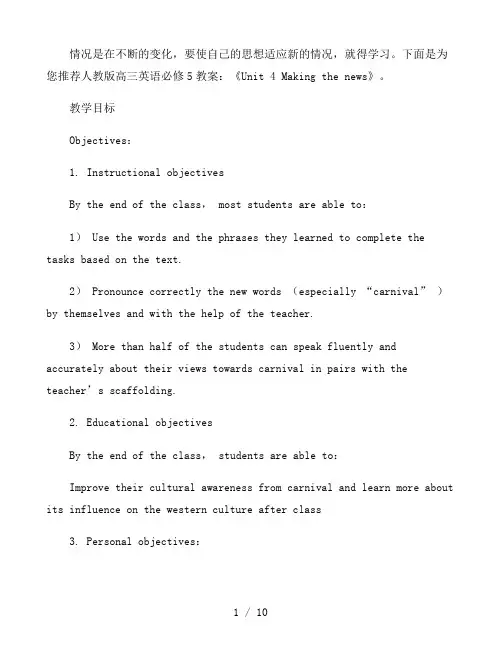
情况是在不断的变化,要使自己的思想适应新的情况,就得学习。
下面是为您推荐人教版高三英语必修5教案:《Unit 4 Making the news》。
教学目标Objectives:1. Instructional objectivesBy the end of the class, most students are able to:1) Use the words and the phrases they learned to complete the tasks based on the text.2) Pronounce correctly the new words (especially “carnival” )by themselves and with the help of the teacher.3) More than half of the students can speak fluently and accurately about their views towards carnival in pairs with thetea cher’s scaffolding.2. Educational objectivesBy the end of the class, students are able to:Improve their cultural awareness from carnival and learn more about its influence on the western culture after class3. Personal objectives:1) Be confident of standing on the stage and speak clearly and spontaneously.2) Encourage students to speak in the class with different kind of techniques.教学重难点Focal points:By the end of the class, students are able to:1) Improve the main reading skills through completing reading tasks in pair work and group work.2) Use the table to finish their essay about their favorite film.Difficult points:By the end of the class, students are able to:1) speak fluently and accurately about their favorite films in pairs with the teacher’s scaffolding.2) Write a film review according to the table and the text.教学过程Procedures and time allotmentStage 1 Getting students ready for learningT: Class begins!Ss:…T: Good afternoon, class!Ss:…T: Today,let’s come to Culture Corner. Module 4. Do you know Chinese festivals?Ss:…T: First, Work in groups, discuss and make a list of Chinese festivals in English. (1min).Ss:…T: OK, time is up. You know Chinese festivals?Ss:…T: very good. For example1.New Year’s Day 元旦节(1月1日)2. Spring Festival 春节(农历正月初一)3. Lantern Festival 元宵节(农历正月15)4. the Qingming Festival 清明节(4月5日)5. Dragon Boat Festival 端午节(农历5月初五6. Double-ninth Day 重阳节(农历9月初九)7.National Day 国庆节(10月1日)T: And festivals brought us much traditional knowledge. So,festival is beautiful. Do you know foreign festivals?Ss:……T: In the textbook, there are some festivals with pictures. Do you know the right descriptions about them?Ss:……T: This festival is at the end of October,when “ghosts” come out.Ss:……T: This is when Americans remember the hard times when they first arrived in the country.Ss:..T: This is a festival of color, which marks the beginning of spring in India.Ss:……T: This is a Christian festival which comes in the middle of winterSs:……T:Let’s watch a video. Can you guess what festival it is? .T: They are dressed up in special clothes, and they are wear masks.Ss:……T: now, First question is how do people feel on this festival?Second is what festival is it?Ss:……T: Yes, very good. Now,let’s watch a video about Carnival.Ss:……T: what do you remember about carnival?Ss:……T: Where did it first?Ss:……Stage 2 Pre-readingStep 1. Listen to the tape.T: Let's listen to the following passage to learn more about carnival. Try to find out what places are mentioned in terms of carnival celebrations.Ss:..T:……Step 2. Scan the passage and try to answer the questions.T: What is the meaning of carnival?Ss:……T:Originally it meant “with no meat”but now it symbolizes “life”.Step 3. Read the passage and match column A with column B.T: OK, now I will give you 1 minute to read it again and then I will ask you someStage 3 While-readingStep 1 Read the passage. Choose the best answers to the two sentences.T: are you finish?Let’s look at the questions.first question is Today Carnival has become a celebration of ____. Which one you choose?A. freedomB. harvestC. life itselfD. successSs:……T: YES, very good. Next question is We need to _____ to understand what carnival is all about.A. look at the history of AmericaB. go to AmericaC. look at the meeting of two cultures---European and AfricanD. Both A and CSs:……T:…….Step 2 check whether the statements are true or false.T:…T: Now,let’s check.With the opening of huge farms and plantations, many Africans went to look for jobs in America.,what’s your idea?Ss:…T: Do you agree?Ss:…T: Excellent, in paragraph 2, this marked the beginning of the slave trade. So the question 1 is False.T: next question 2, The Europeans imported their festivals and later the slaves learned from them and added their traditions.Ss:……T: very good. This answer in paragraph 3.Ss:……T: question 3,The slave trade was abolished and the salves took over the carnival.Ss:……T: the last, With the passing of time, carnival became a festival of the black people only.Ss:…T:Exactly! Superb!Step 3 Skimming for specific informationTask: Answer the questions according to the passage.T: Read the text carefully and answer the questions.Next, we will read the text again to explore how the text organized. 3minutes,Let’s go!T: Now,let’s check your answers. What is carnival today?Ss:Carnival today is an international, multicultural experience.T:The second question is Where were the slaves taken from ?Ss:In AfricaT:…….T: Excellent!Stage5 Post-readingDiscussion: Useful questions to make up dialoguesT: there have seven questions, useful questions to make up dialogues.Have you dressed up in special clothes?2 What did you wear?3 How did you feel?4 Did you eat special food?5 Did you give or receive gifts?6 Did you have a holiday from school?7 Did you enjoy yourself with your family or friends?T: I will divide the class into 3 students in a group. 3 minutes,1, 2, begin!Ss:……T:Time is up. which one do you choose?Ss:…….T: Yes, so the theme of Frankenstein is about science and humanity.T: OK, next group, do you have other answer?Ss:……课后习题homeworkDo exercises on Page 37-38.。
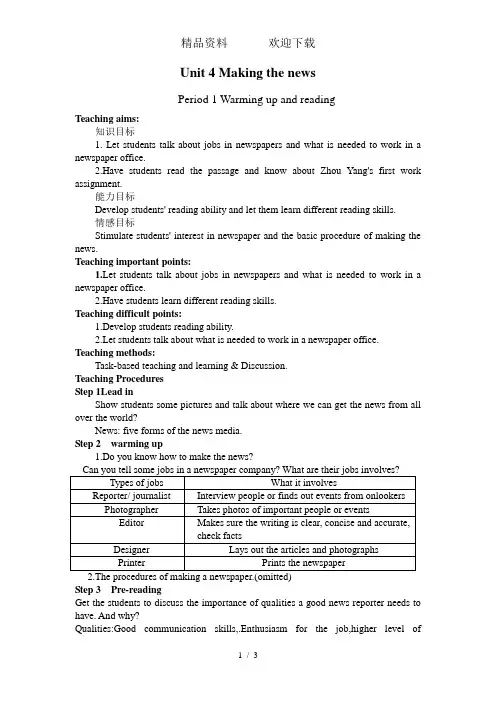
Unit 4 Making the newsPeriod 1 Warming up and readingTeaching aims:知识目标1. Let students talk about jobs in newspapers and what is needed to work in a newspaper office.2.Have students read the passage and know about Zhou Yang's first work assignment.能力目标Develop students' reading ability and let them learn different reading skills.情感目标Stimulate students' interest in newspaper and the basic procedure of making the news.Teaching important points:1.Let students talk about jobs in newspapers and what is needed to work in a newspaper office.2.Have students learn different reading skills.Teaching difficult points:1.Develop students reading ability.2.Let students talk about what is needed to work in a newspaper office. Teaching methods:Task-based teaching and learning & Discussion.Teaching ProceduresStep 1Lead inShow students some pictures and talk about where we can get the news from all over the world?News: five forms of the news media.Step 2 warming up1.Do you know how to make the news?Can you tell some jobs in a newspaper company? What are their jobs involves?Types of jobs What it involvesReporter/ journalist Interview people or finds out events from onlookers Photographer Takes photos of important people or eventsEditor Makes sure the writing is clear, concise and accurate,check factsDesigner Lays out the articles and photographsPrinter Prints the newspaper2.The procedures of making a newspaper.(omitted)Step 3 Pre-readingGet the students to discuss the importance of qualities a good news reporter needs to have. And why?Qualities:Good communication skills,.Enthusiasm for the job,higher level ofeducation,hard working,Curious, active personality...enthusiasm = a strong feeling of interest and enjoyment about something and and eagerness to be involved in it.be full of enthusiasm about…热衷于……Step 4 Reading1.SkimmingWhat’s the main idea of this passage?This passage is about _______’s first _______ at the office of China Daily. And his ________ with his new _____, Hu Xin.Now please listen to the passage and underline the questions which Zhou Yang asks. Try tolook at the way the questions develop.⑴Can I go out on a story immediately?⑵What do I need to take with me?⑶What do I need to remember when I go out to cover a story?⑷What should I keep in mind?⑸Why is listening so important?⑹But how Can I listen carefully while taking notes?⑺Have you ever had a case where someone accused your journalists of getting the wrong end of the stick?2. ScanningTrue or False questions.(TFTFFF)1, Don’t go out on a story on your own at first.2, Take a notebook, a pen as well as a camera.3, Be curious and ask different questions to get all the information4, Talk too much during the interview.5, A reporter doesn’t need to listen to the detailed facts.6, We can always use small recorders to make sure that we get all our facts straight.3 . Careful readingPart 11.When could Zhou Yang cover a story by himself?Not till he is more experienced.2. Why is there no need for him to carry a camera?Because he will have a professional photographer with him to take photographs. Part 2:What does Zhou Yang need to remember when he goes out to cover a story?1.You need to be ______ and able to tell when people are ___________. In that case, you must use __________ or ___________ to find out the truth.2. Don’t be ____, don’t talk too much yourself and must _________________ carefully.3. While listening, you can use ______________ to make sure that you get all the facts ________. It also can provide ______ to support your story, if you are accused.Part 3: Are the following statements true or false?(FFFF)Hu Xin never had a case where somebody accused his reporters of getting the wrong end of the stick.The footballer was accused because he lost the game.The footballer admitted in the interview that he had taken some money from the man.The reporters found out the truth from the footballer’s words.Step 5 RevisionZhou Yang’s notes1.The skills needed2.The importance of listening3.Stages in researching a story4.How to check facts5.How to deal with accusations of liesStep 6 Homework1. Read the text by yourself and finish Ex 1 & 3. (P27-28)2. Read and find out the useful words and expressions in the reading text.。
![高中英语必修五_Unit_4_Making_the_news-Warming_up_and_reading[新人教版课件]](https://uimg.taocdn.com/f795ffe2aeaad1f346933f57.webp)
Unit 4 Making the news Ⅰ. 单元教学目标Ⅱ. 目标语言Ⅲ. 教材分析与教材重组1. 教材分析本单元的中心话题是“新闻”,内容涉及新闻工作者应该具备的素质和新闻采访的基本程序等。
语言技能和语言知识主要围绕“新闻”这一中心话题进行设计。
1.1 Warming Up 通过讨论引出报社工作人员的类别和职责。
1.2 Pre-reading首先通过一个调查问卷引导学生了解一个优秀的记者应该具备的素质;然后引导学生谈论他们的“第一次”经历和感受;最后通过一个“假设”为下一部分的学习做好准备。
1.3 Reading通过Zhou Yang,一名的新员工和他的上司Hu Xin,一位资深记者之间的谈话引导学生了解新闻工作者应该具备的素质,新闻采访的基本程序以及采访时应该注意的要点等。
1.4 Comprehending设计了四个教学活动来加深学生对Reading部分的理解。
Ex. 1要求学生根据要求,阅读文章,获取所需信息;Ex. 2要求学生把阅读部分分成三个小节,并说明每小节的要点;Ex. 3通过形容词归类进一步引导学生思考一个优秀的文字记者和摄影记者应该具备的素质。
1.5 Learning about Language部分归纳和运用了本单元的一些重点词汇和语法。
1.6 Using Language部分涵盖了听、说、读、写四项语言基本技能。
首先通过阅读GETTING THE “SCOOP”一文,介绍“新闻”写作的步骤和见报前的有关程序,并讨论文中这位“影星”可能说了什么谎话,在阅读和讨论的基础上写出一条有关某“影星”的独家新闻;然后要求学生听一段对篮球明星姚明的采访录音,做听力练习;最后要求学生通过两人对话复习巩固有关交际功能“约会”的用语。
1.7 SUMMING UP部分归纳了本单元的主要学习内容并让学生自我检测一下学习效果。
1.8 LEARNING TIP部分建议学生尽可能多地阅读一些适合中学生的英文报纸。
My first work assignment“Unforgettable”, says new journalistNever will I Zhou Yang(ZY) forget his first assignment at the office of a popular English newspaper. His discussion with his new boss, Hu Xin(HX), was to strongly influence his life as a journalist.HX: Welcome. We’re delighted you’re coming to work with us. Your first job here will be an assistant journalist.Dou you have any questions?ZY: Can I go out on a story immediately?HX: (laughing) That’s admirable, but I’m afraid it would be unusual! Wait till you’re more experienced. First we’ll put you as an assistant to an experience journalist. Later you can cover a story and submit the article yourself.ZY: Wonderful! What do I need to take with me? I already have a notebook and camera.HX: No need for a camera. You’ll have a professional photography with you to take photographs. Yo u’ll find your colleagues very eager to assist you, so you may be able to concentrate on photography later if you’re interested.ZY: Thank you. Not only am I interested in photography, but I took an amateur course at university to update my skills.HX: Good.ZY: what do I need to remember when I go out to cover a story?HX: You need to be curious. Only if you ask as many different questions will you acquire all the information you need to know. We say a good journalist must have a good “noose” for a story. That means you must be able to assess when people are not telling the whole truth and then try to discover it. They must use research to inform themselves of the missing parts of the story.ZY: What should I keep in mind?HX: Here comes my list of dos and don’ts: don’t miss your deadline, don’t be rude, don’t talk too much, but make sure you listen to the interviewee carefully.ZY: Why is listening so important?HX: Well, you have to listen for detailed facts. Meanwhile you have to prepare the next question depending on what the person says.ZY: But how can I listen carefully while taking notes?HX: That is a trick of the trade. If the interviewee agrees, you can use a recorder to get the facts straight. It’s also useful if a person wants to challenge you. You have the evidence to support your story.ZY: I see! Have you ever had a case where someone accused your journalist of getting the wrong end of the stick? HX: Yes, but it was a long time ago. This is how the story goes. A footballer was accused of taking money or deliberately not scoring goals so as to let the other team win. We went to interview him. He denied taking money but we were skeptical. So we arranged an interview between the footballer and the man supposed to bribe him. When we saw them together we guessed from the footballer’s body language that he was not telling the truth. So we wrote an article suggesting he was guilty. It was a dilemma because the footballer could have demanded damages if we were wrong. He tried to stop us publishing it but later we were proved right.ZY: Wow! That was a real “scoop”. I’m looking forward to my first assignment now. Perhaps I’ll get a scoop too! HX: Perhaps you will. You never know.。